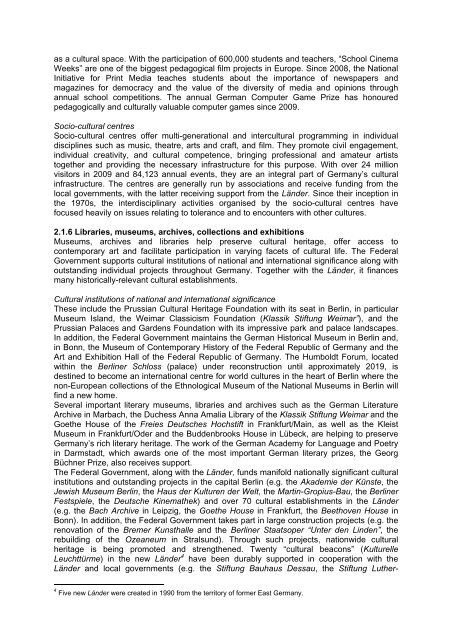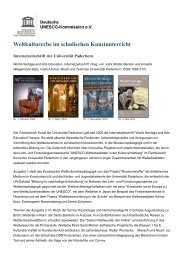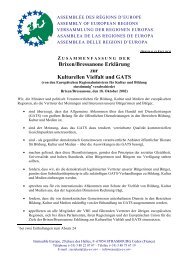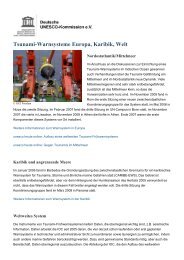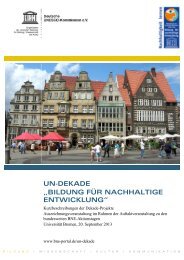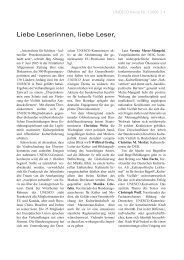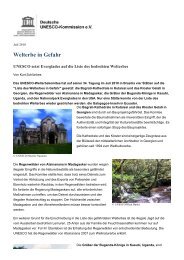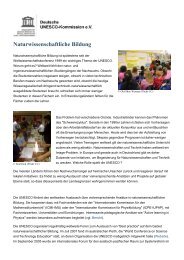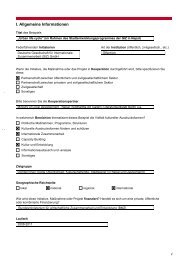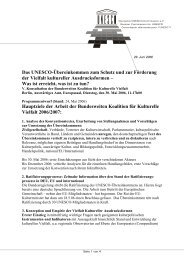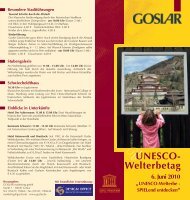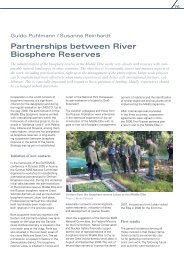Annex Form - Deutsche UNESCO-Kommission
Annex Form - Deutsche UNESCO-Kommission
Annex Form - Deutsche UNESCO-Kommission
Create successful ePaper yourself
Turn your PDF publications into a flip-book with our unique Google optimized e-Paper software.
as a cultural space. With the participation of 600,000 students and teachers, “School Cinema<br />
Weeks” are one of the biggest pedagogical film projects in Europe. Since 2008, the National<br />
Initiative for Print Media teaches students about the importance of newspapers and<br />
magazines for democracy and the value of the diversity of media and opinions through<br />
annual school competitions. The annual German Computer Game Prize has honoured<br />
pedagogically and culturally valuable computer games since 2009.<br />
Socio-cultural centres<br />
Socio-cultural centres offer multi-generational and intercultural programming in individual<br />
disciplines such as music, theatre, arts and craft, and film. They promote civil engagement,<br />
individual creativity, and cultural competence, bringing professional and amateur artists<br />
together and providing the necessary infrastructure for this purpose. With over 24 million<br />
visitors in 2009 and 84,123 annual events, they are an integral part of Germany’s cultural<br />
infrastructure. The centres are generally run by associations and receive funding from the<br />
local governments, with the latter receiving support from the Länder. Since their inception in<br />
the 1970s, the interdisciplinary activities organised by the socio-cultural centres have<br />
focused heavily on issues relating to tolerance and to encounters with other cultures.<br />
2.1.6 Libraries, museums, archives, collections and exhibitions<br />
Museums, archives and libraries help preserve cultural heritage, offer access to<br />
contemporary art and facilitate participation in varying facets of cultural life. The Federal<br />
Government supports cultural institutions of national and international significance along with<br />
outstanding individual projects throughout Germany. Together with the Länder, it finances<br />
many historically-relevant cultural establishments.<br />
Cultural institutions of national and international significance<br />
These include the Prussian Cultural Heritage Foundation with its seat in Berlin, in particular<br />
Museum Island, the Weimar Classicism Foundation (Klassik Stiftung Weimar”), and the<br />
Prussian Palaces and Gardens Foundation with its impressive park and palace landscapes.<br />
In addition, the Federal Government maintains the German Historical Museum in Berlin and,<br />
in Bonn, the Museum of Contemporary History of the Federal Republic of Germany and the<br />
Art and Exhibition Hall of the Federal Republic of Germany. The Humboldt Forum, located<br />
within the Berliner Schloss (palace) under reconstruction until approximately 2019, is<br />
destined to become an international centre for world cultures in the heart of Berlin where the<br />
non-European collections of the Ethnological Museum of the National Museums in Berlin will<br />
find a new home.<br />
Several important literary museums, libraries and archives such as the German Literature<br />
Archive in Marbach, the Duchess Anna Amalia Library of the Klassik Stiftung Weimar and the<br />
Goethe House of the Freies <strong>Deutsche</strong>s Hochstift in Frankfurt/Main, as well as the Kleist<br />
Museum in Frankfurt/Oder and the Buddenbrooks House in Lübeck, are helping to preserve<br />
Germany’s rich literary heritage. The work of the German Academy for Language and Poetry<br />
in Darmstadt, which awards one of the most important German literary prizes, the Georg<br />
Büchner Prize, also receives support.<br />
The Federal Government, along with the Länder, funds manifold nationally significant cultural<br />
institutions and outstanding projects in the capital Berlin (e.g. the Akademie der Künste, the<br />
Jewish Museum Berlin, the Haus der Kulturen der Welt, the Martin-Gropius-Bau, the Berliner<br />
Festspiele, the <strong>Deutsche</strong> Kinemathek) and over 70 cultural establishments in the Länder<br />
(e.g. the Bach Archive in Leipzig, the Goethe House in Frankfurt, the Beethoven House in<br />
Bonn). In addition, the Federal Government takes part in large construction projects (e.g. the<br />
renovation of the Bremer Kunsthalle and the Berliner Staatsoper “Unter den Linden”, the<br />
rebuilding of the Ozeaneum in Stralsund). Through such projects, nationwide cultural<br />
heritage is being promoted and strengthened. Twenty “cultural beacons” (Kulturelle<br />
Leuchttürme) in the new Länder 4 have been durably supported in cooperation with the<br />
Länder and local governments (e.g. the Stiftung Bauhaus Dessau, the Stiftung Luther-<br />
4 Five new Länder were created in 1990 from the territory of former East Germany.


